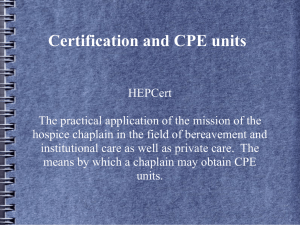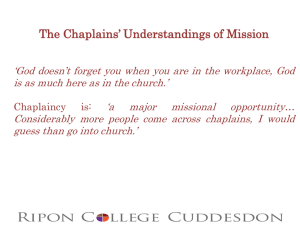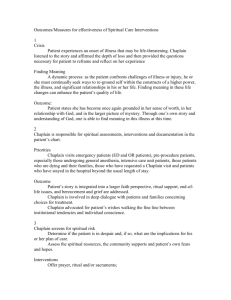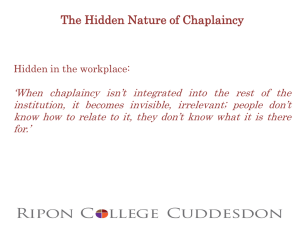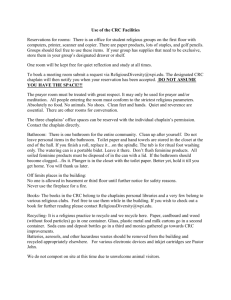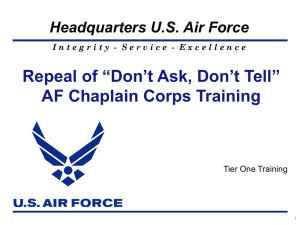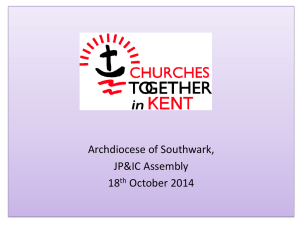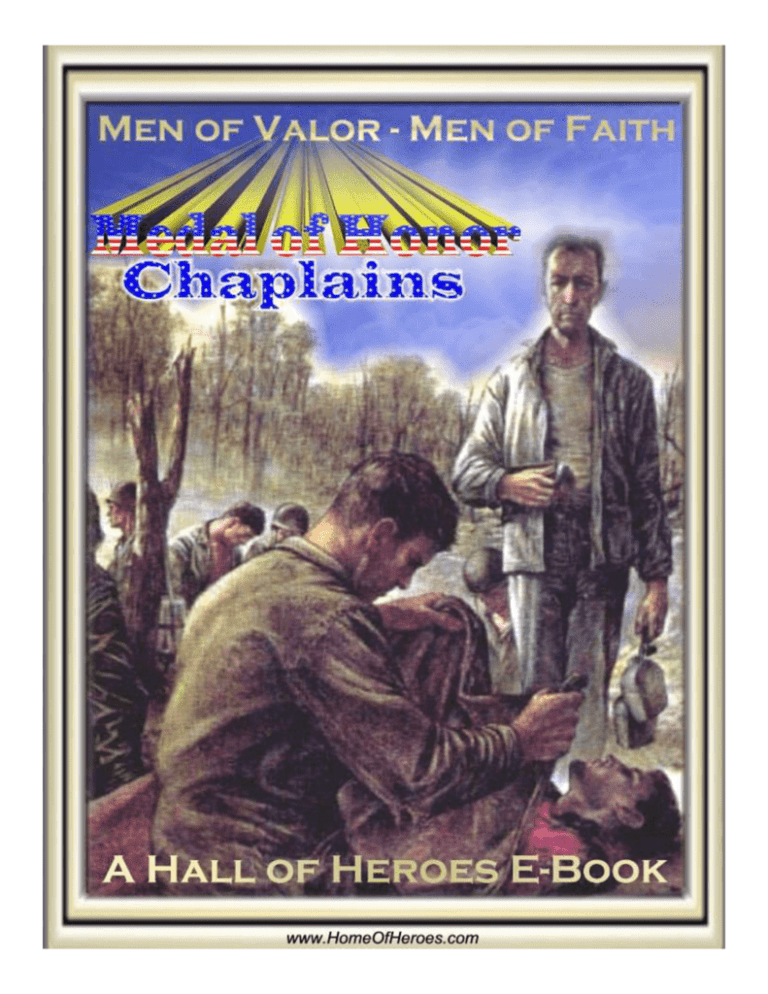
Men of Valor – Men of Faith
A Hall Of Heroes E-Book
These pages are provided by the Hall Of Heroes, Pueblo Colorado. You may feel free to reproduce and use them in any
quantity for all non-commercial, educational or patriotic programs. Non-profit organizations may print this booklet in
quantity for fundraising purposes.
HomeOfHeroes.com
P.O. Box 122
Pueblo, CO 81003
Copyright© 2003, HomeOfHeroes.com, Inc.
ALL RIGHTS RESERVED
WWW.HOMEOFHEROES.COM
U.S. Army and Navy Chaplains
Serving God, Country, and Fellow Man
Since the Revolutionary War
This booklet courtesy of www.HomeOfHeroes.com
Page 1
Men of God in military service predates even the organized army of the United States for, even in
the early years, chaplains served those who went in harm's way on an unpaid, volunteer basis.
When General George Washington assumed command of the Continental Army in 1775, he found
fifteen chaplains already serving among his 23 regiments. On July 29, 1775 the Continental
Congress recognized the important role of the Army chaplain, authorizing one chaplain for each
regiment and granting them payment equal to the salary of a captain.
Four months later on November 28, 1775 the role of the Navy chaplain was established in the
second article of Navy regulations. It read: "The commanders of the ships of the Thirteen United
Colonies are to take care that divine service be performed twice a day on board, and a sermon
preached on Sundays, unless bad weather or other extraordinary accidents prevent."
It was during the War with Mexico that Catholic Priests joined their Protestant and Jewish
counterparts. Chaplains of all three faiths served during the Civil War. On March 8, 1862 the
USS Cumberland was rammed and sunk at Newport News, VA claiming the life of Navy Chaplain
John Lenhart, the first Chaplain to die in service to God, Country and fellow man.
Four Army chaplains earned Medals of Honor during the Civil War. Most were officially
assigned as chaplains, though it was not unusual for a line officer of the regiment to be elected as
chaplain. Such was the case with James Hill, a former Baptist minister who joined the 21st Iowa
Infantry. Though unanimously elected Regimental Chaplain on August 4, 1863, he continued to
lead his troops in battle and became known as the "fighting chaplain". Two Army chaplains
received their Nation's highest honor for carrying wounded soldiers from the battlefield, a fourth
was honored when he voluntarily took up arms to defend his comrades.
This booklet courtesy of www.HomeOfHeroes.com
Page 1
Army/Navy Chaplain Recipients of the Medal of Honor
Civil War
John Milton Whitehead
Chaplain, US Army
Born: March 06, 1823 at Wayne County, IN
Entered Service: Westville, IN
Date/Place of Action: December 31, 1862 - Stone River, TN
Unit: 15th Indiana Infantry
Presentation: April 04, 1898
Date of Death: March 08, 1909
Buried At: Topeka Cemetery - Topeka, KS
CITATION:
Went to the front during a desperate contest and unaided carried to the rear
several wounded and helpless soldiers
Francis Bloodgood Hall
Chaplain, US Army
Born: November 16, 1827 at New York, NY
Entered Service: Plattsburgh, NY
Date/Place of Action: May 03, 1863 - Salem Heights, VA
Unit: 16th New York Infantry
Presentation: February 16, 1897
Date of Death: October 04, 1903
Buried At: Riverside Cemetery - Plattsburgh, NY
CITATION:
Voluntarily exposed himself to a heavy fire during the thickest of the fight and
carried wounded men to the rear for treatment and attendance.
James Hill
First Lieutenant, US Army
Born: December 06, 1822 at Bristol, England
Entered Service: Cascade, IA
Date/Place of Action: May 16, 1863 - Champion Hill, MS
Unit: Company I, 21st Iowa Infantry
Presentation: March 15, 1893
Date of Death: September 22, 1899
Buried At: Cascade Community Cemetery - Cascade, IA
CITATION:
By skillful and brave management captured three of the enemy's pickets.
This booklet courtesy of www.HomeOfHeroes.com
Page 2
Army/Navy Chaplain Recipients of the Medal of Honor
Milton Lorenzi Haney
Regimental Chaplain, US Army
Born: January 23, 1825 at Savannah, OH
Entered Service: Bushnell, IL
Date/Place of Action: July 22, 1864 - Atlanta, GA
Unit: 55th Illinois Infantry
Presentation: November 03, 1896
Date of Death: January 20, 1922
Buried At: Mountain View Cemetery - Altadena, CA
CITATION:
Voluntarily carried a musket in the ranks of his regiment and rendered heroic
service in retaking the Federal works which had been captured by the enemy.
Boxer Rebellion
The job of Chaplain Assistant wasn't authorized until December 28, 1909 when G.O No. 253
stated: "One enlisted man will be detailed on special duty...for the purpose of assisting the
chaplain in the performance of his official duties." Prior to establishment of an official position
for the Chaplain Assistant however, it was not uncommon for younger soldiers to assist their
chaplain in the conduct of services. One who did was 20-year-old musician Calvin Titus, who
assisted Army Chaplain Leslie R. Groves in ministering to American soldiers in China.
Scaling a 30-foot wall under fire from enemy soldiers was never envisioned in the job description
of a Chaplain Assistant when it was defined in 1909. During the Boxer Rebellion in China nine
years earlier however, when when a volunteer was needed, it was musician Calvin Titus who
answered the call.
Though not officially a Chaplain Assistant--the MOS had not yet been authorized--he might well
be considered the first and only Chaplain Assistant to earn the Medal of Honor.
Calvin Pearl Titus
Musician, US Army
Born: September 22, 1879 at Vinton, IA
Entered Service: Iowa
Date/Place of Action: August 14, 1900 - Peking, China
Unit: Company E, 14th US Infantry
Presentation: Presented at West Point
by President Theodore Roosevelt on March 11, 1902
Date of Death: May 27, 1966
Buried At: Forest Lawn Memorial Park - Hollywood, CA
CITATION:
Gallant and daring conduct in the presence of his colonel and other officers and
enlisted men of his regiment; was first to scale the wall of the city.
This booklet courtesy of www.HomeOfHeroes.com
Page 3
Army/Navy Chaplain Recipients of the Medal of Honor
The moniker Fighting Chaplain may have applied literally to
Civil War hero James Hill. For many chaplains it was a
figurative title, however. Most chaplains who came to be called
Fighting Chaplains gained the nickname, not for taking up arms,
but because they went where the fighting was--risking their own
lives to minister to men on the battlefield. Colonel Theodore
Roosevelt twice commended the chaplain of his famous Rough
Riders, Chaplain Henry A. Brown (seen in photo ministering to
the men of the 1st U.S. Volunteer Cavalry in Cuba.)
World War I gave Chaplaincy a true legend, Father Francis P. Duffy of the Fighting
69th. During two days of battle beginning on July 14, 1918 Father Duffy worked
tirelessly for 48 straight hours to rescue wounded and administer Last Rites to the dying.
On the morning of the 16th when it seemed all was lost, Major Anderson offered Father
Duffy some grenades to make a last stand. "Thanks," answered the chaplain, "but I'll
stick to my own trade."
While no chaplains earned Medals of Honor during World War I, Father Duffy became
as legendary as Sergeant York and Eddie Rickenbacker. For his heroic service, Father
Duffy was awarded the Distinguished Service Cross, the Distinguished Service Medal, the
Croix de Guerre and other high awards. Today, a statue of him stands in Times Square
in New York City.
Chapel services were in progress at 7:55 a.m. on the morning of December 7, 1941 when Japanese
bombs began raining on Pearl Harbor. Dedicated chaplains did their best to care for the wounded and
comfort the dying. Aboard the cruiser New Orleans Chaplain Howell Fogey joined the human chain
passing ammo to keep the big guns firing back. When one enemy Zero began to fall from the sky he
paused long enough to echo what would become a national battlecry: "Praise the Lord and Pass the
Ammunition."
Aboard the USS Arizona and the USS Oklahoma, Chaplains Thomas Kirkpatrick and Aloysius Schmitt
died with their fellow sailors--the first Navy chaplains killed in action since the Civil War. Before
World War II ended, they would be joined in their sacrifice by 77 Army chaplains as Men of God went
wherever American soldiers were called to duty.
This booklet courtesy of www.HomeOfHeroes.com
Page 4
Army/Navy Chaplain Recipients of the Medal of Honor
Joseph Timothy O'Callahan
Commander, US Navy
Born: May 14, 1904 at Boston, MA
Entered Service: Massachusetts
Date/Place of Action: March 19, 1945 - Kobe, Japan
Unit: U.S.S. Franklin
Presentation: Presented At the White House
By President Harry S Truman on January 23, 1946
Date of Death: March 18, 1964
Buried At: Holy Cross College Cemetery - Worcester, MA
Catholic Chaplain – World War II
CITATION:
For conspicuous gallantry and intrepidity at the risk of his life above and beyond the call of duty
while serving as chaplain on board the U.S.S. Franklin when that vessel was fiercely attacked by
enemy Japanese aircraft during offensive operations near Kobe, Japan, on 19 March 1945. A
valiant and forceful leader, calmly braving the perilous barriers of flame and twisted metal to aid
his men and his ship, Lt. Commander O'Callahan groped his way through smoke-filled corridors
to the open flight deck and into the midst of violently exploding bombs, shells, rockets, and other
armament. With the ship rocked by incessant explosions, with debris and fragments raining down
and fires raging in ever-increasing fury, he ministered to the wounded and dying, comforting and
encouraging men of all faiths; he organized and led firefighting crews into the blazing inferno on
the flight deck; he directed the jettisoning of live ammunition and the flooding of the magazine; he
manned a hose to cool hot, armed bombs rolling dangerously on the listing deck, continuing his
efforts, despite searing, suffocating smoke which forced men to fall back gasping and imperiled
others who replaced them. Serving with courage, fortitude, and deep spiritual strength, Lt.
Commander O'Callahan inspired the gallant officers and men of the Franklin to fight heroically
and with profound faith in the face of almost certain death and to return their stricken ship to
port.
.
This booklet courtesy of www.HomeOfHeroes.com
Page 5
Army/Navy Chaplain Recipients of the Medal of Honor
The Marine Corps is a fighting unit, and relies on the Navy to provide its chaplains and corpsmen. The
first Navy chaplain to accompany Marines into battle was J. F. Fleming who served the First Provisional
Regiment to Nicaragua in 1912. Throughout every war since, Navy chaplains have accompanied
Marines into battle. When the valiant Marines marched into the Chosin Reservoir early in the Korean
War, their chaplains joined them--froze in the bitter cold with them--accompanied them into the field
where they tended wounded and comforted dying.
From the opening shots of the Korean War to Armistice, both Army and Navy chaplains were there.
None earned Medals of Honor, but many received other high awards...mostly posthumously. Thirteen
U.S. Army chaplains were killed in action or died in captivity as P.O.W.s.
*
Army and Navy Chaplains in Vietnam were as dedicated as any Men of God in history. They
served the Vietnamese people as well as the soldiers and Marines in their charge. They built
orphanages, counseled the despondent, wrote letters home to bereaved family, and conducted
far too many memorial services for lost comrades.
They also went where they need not have gone, because duty called. Three chaplains earned
Medals of Honor. Two of them completed one full tour of combat duty, then voluntarily
returned to serve the men who called for them in the darkest hours of life. Both men died in
their moment of valor, shunning danger to tend the wounded and minister to the dying.
This booklet courtesy of www.HomeOfHeroes.com
Page 6
Army/Navy Chaplain Recipients of the Medal of Honor
Vincent Robert Capodanno
Lieutenant, US Navy
Born: February 13, 1929 at Staten Island, NY
Entered Service: Staten Island, NY
Date/Place of Action: Sept 04, 1967 - Quang Tin Province, RVN
Unit: Chaplain Corps, 3d Bn, 5th Marines, 1st Marine Div. (Rein) FMF
Presentation: Presented To His Family At Navy Yard, Washington, DC
By Secretary of the Navy Paul R. Ignatius on January 07, 1969
Date of Death: September 04, 1967 (Killed In Action)
Buried At: Saint Peter's Cemetery - Staten Island, NY
Catholic Chaplain – Vietnam War
CITATION:
For conspicuous gallantry and intrepidity at the risk of his life above and beyond the call of duty as
Chaplain of the 3d Battalion, in connection with operations against enemy forces. In response to
reports that the 2d Platoon of M Company was in danger of being overrun by a massed enemy
assaulting force, Lt. Capodanno left the relative safety of the company command post and ran
through an open area raked with fire, directly to the beleaguered platoon. Disregarding the intense
enemy small-arms, automatic-weapons, and mortar fire, he moved about the battlefield
administering last rites to the dying and giving medical aid to the wounded. When an exploding
mortar round inflicted painful multiple wounds to his arms and legs, and severed a portion of his
right hand, he steadfastly refused all medical aid. Instead, he directed the corpsmen to help their
wounded comrades and, with calm vigor, continued to move about the battlefield as he provided
encouragement by voice and example to the valiant marines. Upon encountering a wounded
corpsman in the direct line of fire of an enemy machine gunner positioned approximately 15 yards
away, Lt. Capodanno rushed a daring attempt to aid and assist the mortally wounded corpsman.
At that instant, only inches from his goal, he was struck down by a burst of machinegun fire. By his
heroic conduct on the battlefield, and his inspiring example, Lt. Capodanno upheld the finest
traditions of the U.S. Naval Service. He gallantly gave his life in the cause of freedom.
.
This booklet courtesy of www.HomeOfHeroes.com
Page 7
Army/Navy Chaplain Recipients of the Medal of Honor
Charles Joseph Watters
Major, US Army
Born: January 17, 1927 at Jersey City, NJ
Entered Service: Fort Dix, NJ
Date/Place of Action: Nov 19, 1967 - Hil 875, Dak To, Vietnam
Unit: Company A, 173d Support Bn, 173d Airborne Brigade
Presentation: Presented To His Family At the White House
By Vice President Spiro T. Agnew on November 04, 1969
Date of Death: November 19, 1967 (Killed In Action)
Buried At: Arlington National Cemetery - Arlington, VA
Catholic Chaplain – Vietnam War
CITATION:
For conspicuous gallantry and intrepidity in action at the risk of his life above and beyond the call of duty.
Chaplain Watters distinguished himself during an assault in the vicinity of Dak To. Chaplain Watters was
moving with one of the companies when it engaged a heavily armed enemy battalion. As the battle raged and
the casualties mounted, Chaplain Watters, with complete disregard for his safety, rushed forward to the line
of contact. Unarmed and completely exposed, he moved among, as well as in front of the advancing troops,
giving aid to the wounded, assisting in their evacuation, giving words of encouragement, and administering
the last rites to the dying. When a wounded paratrooper was standing in shock in front of the assaulting
forces, Chaplain Watters ran forward, picked the man up on his shoulders and carried him to safety. As the
troopers battled to the first enemy entrenchment, Chaplain Watters ran through the intense enemy fire to
the front of the entrenchment to aid a fallen comrade. A short time later, the paratroopers pulled back in
preparation for a second assault. Chaplain Watters exposed himself to both friendly and enemy fire between
the 2 forces in order to recover 2 wounded soldiers. Later, when the battalion was forced to pull back into a
perimeter, Chaplain Watters noticed that several wounded soldiers were Lying outside the newly formed
perimeter. Without hesitation and ignoring attempts to restrain him, Chaplain Watters left the perimeter
three times in the face of small arms, automatic weapons, and mortar fire to carry and to assist the injured
troopers to safety. Satisfied that all of the wounded were inside the perimeter, he began aiding the medics-applying field bandages to open wounds, obtaining and serving food and water, giving spiritual and mental
strength and comfort. During his ministering, he moved out to the perimeter from position to position
redistributing food and water, and tending to the needs of his men. Chaplain Watters was giving aid to the
wounded when he himself was mortally wounded. Chaplain Watters' unyielding perseverance and selfless
devotion to his comrades was in keeping with the highest traditions of the U.S. Army.
.
This booklet courtesy of www.HomeOfHeroes.com
Page 8
Army/Navy Chaplain Recipients of the Medal of Honor
Charles James Angelo Liteky
Captain, US Army
Born: February 14, 1931 at Washington, DC
Entered Service: Fort Hamilton, NY
Date/Place of Action: Dec. 06, 1967 - Phuoc-Lac, Bien Hoa Province, RVN
Unit: HHC, 199th Infantry Brigade (Separate) (Light)
Presentation: Presented At the White House
By President Lyndon B. Johnson on November 19, 1968
STILL LIVING
Catholic Chaplain – Vietnam War
CITATION:
Chaplain Liteky distinguished himself by exceptional heroism while serving with Company A, 4th Battalion, 12th
Infantry, 199th Light Infantry Brigade. He was participating in a search and destroy operation when Company A came
under intense fire from a battalion size enemy force. Momentarily stunned from the immediate encounter that ensued,
the men hugged the ground for cover. Observing 2 wounded men, Chaplain Liteky moved to within 15 meters of an
enemy machinegun position to reach them, placing himself between the enemy and the wounded men. When there was a
brief respite in the fighting, he managed to drag them to the relative safety of the landing zone. Inspired by his
courageous actions, the company rallied and began placing a heavy volume of fire upon the enemy's positions. In a
magnificent display of courage and leadership, Chaplain Liteky began moving upright through the enemy fire,
administering last rites to the dying and evacuating the wounded. Noticing another trapped and seriously wounded man,
Chaplain Liteky crawled to his aid. Realizing that the wounded man was too heavy to carry, he rolled on his back, placed
the man on his chest and through sheer determination and fortitude crawled back to the landing zone using his elbows
and heels to push himself along. pausing for breath momentarily, he returned to the action and came upon a man
entangled in the dense, thorny underbrush. Once more intense enemy fire was directed at him, but Chaplain Liteky stood
his ground and calmly broke the vines and carried the man to the landing zone for evacuation. On several occasions
when the landing zone was under small arms and rocket fire, Chaplain Liteky stood up in the face of hostile fire and
personally directed the medivac helicopters into and out of the area. With the wounded safely evacuated, Chaplain
Liteky returned to the perimeter, constantly encouraging and inspiring the men. Upon the unit's relief on the morning of
7 December 1967, it was discovered that despite painful wounds in the neck and foot, Chaplain Liteky had personally
carried over 20 men to the landing zone for evacuation during the savage fighting. Through his indomitable inspiration
and heroic actions, Chaplain Liteky saved the lives of a number of his comrades and enabled the company to repulse the
enemy. Chaplain Liteky's actions reflect great credit upon himself and were in keeping with the highest traditions of the
U.S. Army.
.
This booklet courtesy of www.HomeOfHeroes.com
Page 9
Army/Navy Chaplain Recipients of the Medal of Honor
The Four Chaplains
Of World War II
Rabbi Alexander Goode
Reverend George L. Fox
Reverend Clark V. Polling
Father John P. Washington
During World War II some 8,000 Army chaplains dedicated their lives and service to the
fighting men of The Greatest Generation. Though these chaplains earned 2,453 high military
awards for their valor, none received the Medal of Honor. Four of the seventy-seven who gave
their lives in service received one of the most unusual and distinct medals in history. Ordered
by special Congressional action, its intent was to carry the same weight and prestige as the
Medal of Honor. It is known simply as The Four Chaplains Medal, and calls to memory four
men of God, one Jewish, one Catholic, and two Protestant, who overcame the boundaries of
denomination to become brothers serving the same Father.
Early on the morning of February 3, 1943 a German
submarine torpedoed the USAT Dorchester, an American
troop transport ship, in the frigid Atlantic waters near
Greenland. In the fearful 27 minutes before the Dorchester
sank beneath the waves, the four brave chaplains brought
order in chaos, directing soldiers to the decks and loading
them in life rafts. When the last of the life jackets had been
dispersed, the four chaplains removed their own life vests and
placed them on men who had none.
When seen for the last time by the men who had reached the life boats, the Four Chaplains
stood braced against the railing of the sinking ship--arms linked and singing praises to their
Father.
This booklet courtesy of www.HomeOfHeroes.com
Page 10
"The Nation's leading website for information about patriotism, the
Medal of Honor and military history."
The Pueblo Chieftain
The HomeOfHeroes.com website is a virtual library with more than 15,000 HTML pages
(more than 50,000 printed pages) of historical and patriotic information. Featured by CNN,
The New York Times, Readers Digest, The Chicago Herald and other national print and
broadcast media, it has become a major source of information for educators around the world.
From our pages, visitors can easily print pictures and
wall posters of significance, timelines of American history,
the documents of our nation, and even the inaugural
speeches (as well as other notable addresses) of all American
Presidents. All material is available free and costs only the
investment of a little time, paper and ink. Wall posters like
our "Pledge of Allegiance" poster are popular in schools
around America.
Many of our informative and inspirational web stories have been made available from the
site in book format, in easy to download and print .pdf or Microsoft® Word2000® format.
Some of our FREE books include:
Please visit us online at:
www.HomeOfHeroes.com
For information contact:
Doug Sterner – 3111 Thatcher – Pueblo, CO 81005
(719) 564-1755
E-mail: Doug@HomeOfHeroes.com

